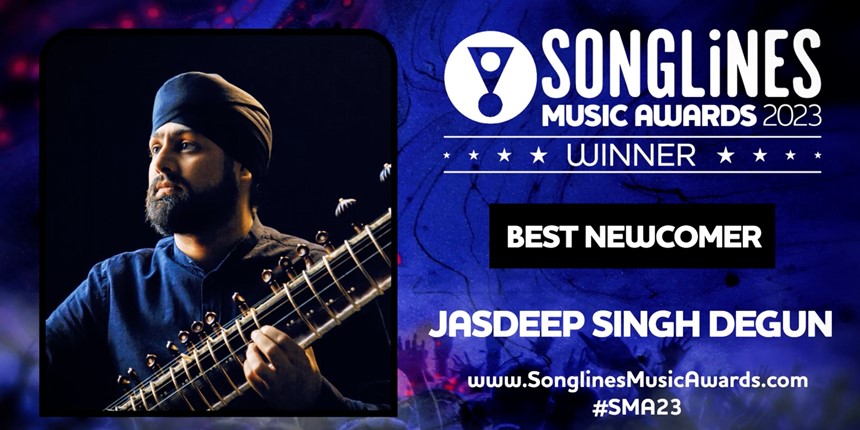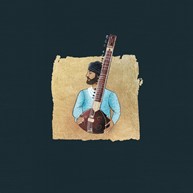Newcomer Award
Jasdeep Singh Degun


Since being featured as a Songlines Introducing… artist in #155 (March 2020), Jasdeep Singh Degun has made great strides. At the time, he was launching Arya, his concerto for sitar (his primary instrument), which was commissioned and performed by Opera North and its orchestra. Three years on and he has released his debut record, Anomaly (Real World, 2022) and launched Orpheus, a classical Indian take on Monteverdi’s 17th-century opera, both of which have won him deserved recognition and many awards (the Asian Achievers Award and a National Indian Arts Award are but two).
While Anomaly allowed him to develop a personal vision for the first time, Orpheus (commissioned by Opera North in collaboration with South Asian Arts UK) saw him negotiate and fuse the worlds of Eastern and Western sound, notation and culture. All the while, he has continued to tour and collaborate with a diverse range of musicians, constantly developing his sound and identity as a composer.
The Songlines Best Newcomer award is granted to him in recognition of his new, insightful and powerful contribution to Asian and Fusion sounds, as well as his staggering vision for what music can be and do. We asked him about his journey to this point and plans going forward. EMMA RYCROFT
Congratulations Jasdeep! How do you feel?
Brilliant. It’s a really nice surprise.
Anomaly started something big for you. How does it feel looking back on it now?
It really was the catalyst for everything I’m doing at the moment… I got a scholarship from Sky Arts in 2017 to make the album. It was such a prestigious thing that rather than just being about me and the sitar I thought, ‘Let me make the most of this by identifying the good Indian classical musicians who fall under the radar…’ Then in the pandemic suddenly Peter Gabriel heard the album and he said, ‘Okay, let’s sign him.’ Then I toured while still doing a lot of stuff with Opera North: I became artist-in-residence, then I did Orpheus. Doing Anomaly meant I had the skillset to be able to then go off and do other projects, it gave me the opportunity to pursue my vision… I still look back and I’m very proud of it. I put everything into it. It took me almost four years to make.
How did Orpheus come about and how did you approach it?
At the point when I got involved in the project, it was going to be some Indian people singing and playing around the Western opera. I came in for a workshop and rehearsal and I just went, ‘nope, this is not good. Reductionist, tokenistic…’ I said you need to have half music which is Indian classical music, it can’t be the full opera… I had to convince all my musician friends this was going to be something vastly different and I had to go to Opera North… I had to go to my teacher and South Asian Arts and say, ‘look I know you had a certain vision, but please trust me with this,’ and they did. It was hard, it was the hardest thing I’ve ever done… Luckily it was a huge success.
Are there any plans for the near future that we can look forward to?
At the moment I’m thinking about my next album… I’ve also been made a fellow of innovation at the Royal Northern College of Music and I’m working with students there.
Final thoughts?
I see these awards as a spotlight on all the Indian classical musicians in this country. I want to use this opportunity to say ‘go and listen to British-Asian classical musicians.’ Anomaly might be a good starting point but start digging into these other great musicians. It’s got my name on the award, but for me it’s very much a coup for all of us, and that fills me with pride.
